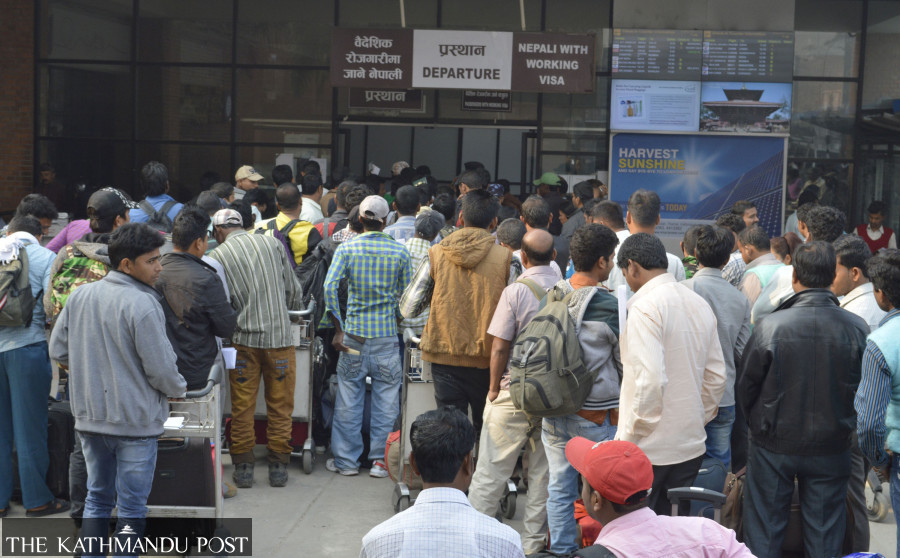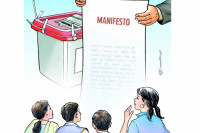National
Policy to deny entry to unjabbed workers is discriminatory, rights groups say
While labour-importing countries should withdraw discriminatory policies and ensure vaccines to all, Nepal should prioritise outbound workers for Covid-19 vaccination, they demand.
Chandan Kumar Mandal
Nepali migrant rights activists and organisations have slammed labour destination countries for barring entry to unvaccinated Nepalis workers, calling it a violation of their human rights.
Recent rules imposed by labour-importing countries in the Persian Gulf, Malaysia and others have made entry difficult for unvaccinated Nepali migrants and deprived them of taking up overseas jobs.
According to migrant rights groups and activists, such restrictions amount to discrimination and will have significant financial and social impacts on thousands of women and men planning to migrate for employment to the Gulf or those who have come home on leave.
“Their decision not to allow unvaccinated Nepalis is discriminatory because countries should not be practising any forms of discrimination during challenging times like the Covid-19 pandemic. Even the United Nations has urged countries to ensure the rights to health and non-discrimination to all,” Deepika Thapaliya, a lawyer and research project manager at Equidem Nepal, a human rights and labour rights consultancy.
“Nepal is already struggling to contain the Covid-19 pandemic and vaccinate its highly vulnerable people. Imposition of such rules by labour destination countries further affects poor migrants who are already vulnerable groups and looking for opportunities abroad. Such a decision is insensitive.”
A guidance note issued jointly by the UN Committee on Migrant Workers, the Special Rapporteur on the Human Rights of Migrants, the Office of the UN High Commissioner for Human Rights, and regional human rights experts in March said that “migrants in irregular situations must not be penalised or targeted for immigration enforcement when seeking access to Covid-19 vaccination.”
The guidance note also urged countries to include all migrants in Covid-19 vaccination programmes regardless of their nationality and migration status.
It also called on states to take into account the vulnerabilities, risks and needs of those migrants who are most exposed and vulnerable to coronavirus when drawing up their prioritisation lists for vaccination.
However, in recent weeks, various labour destination countries have either banned unvaccinated foreigners, including Nepalis or imposed strict quarantine requirements as a condition for their entry. These new rules have dashed the job prospects of Nepali migrants, a majority of whom are not vaccinated and are too poor to be able to pay for quarantine.
Through a joint statement, a group of Nepal’s migrant rights organisations have criticised the decision by various Gulf countries to prevent entry to foreigners including Nepali migrant workers unless they have been vaccinated for Covid-19 without offering access to vaccines or other means to travel for work.
The Center for Migration and International Relations, Equidem Nepal, Law and Policy Forum for Social Justice, Samata Foundation and Shramik Sanjal, expressed their concerns over the policies announced by at least three countries, Kuwait, Saudi Arabia, and the United Arab Emirates (UAE)—major destinations for Nepalese migrant workers, and said the policies violate the human rights of the workers.
“We recognise the devastating impact of the global Covid-19 pandemic and the importance of ensuring safe migration between Nepal and the Gulf. Unfortunately, Nepalis workers do not have access to the vaccines that are critical to ensuring safe migration,” the organisations said in the joint statement. “The Gulf countries should arrange for an alternative process for safe travel from Nepal to the Gulf, or offer vaccines to workers. The unilateral implementation of the restrictive policy has impacted employment plans of thousands of workers and left them in uncertainty.”
Kuwait has already announced that unvaccinated foreigners, including job-seeker Nepalis, will not be allowed entry to the country. The policy will be implemented from August 1.
The UAE has already barred foreign nationals, including Nepalis, from entering the country except for citizens of certain countries who have been vaccinated, from June 23, 2021.
Saudi Arabia has been preventing non-vaccinated foreign nationals from entering, and it still upholds the policy in the travel guidelines updated on July 3, which says all guests must obtain and show proof of vaccination.
According to labour rights organisations, these decisions also state that only those individuals who have received the full doses of approved vaccines will be allowed to enter the countries.
“It is the responsibility of destination countries, mainly employers, to arrange everything on behalf of the workers until they report to their jobs. Hence, they should have come forward and been more sensitive in addressing the workers’ concerns during the pandemic,” said Thapaliya. “However, they simply ignored the helpless situation of migrants and imposed such rules, even without considering their impact on the livelihoods of the workers.”
Nepali workers are critical to the economies of labour-importing countries including Kuwait, Saudi Arabia and the UAE. Despite the announcement of the new rules on foreigners, the demand for Nepali workers and employers in these countries remains impressive and Nepal authorities have continued to issue labour permits.
Such policies have not only affected new workers but also has prevented those who have come home on leave with a plan to return, exposing them to the risk of losing their jobs and the end of service payments, which are significant amounts for them.
“Usually, when workers go home on leave with a plan to return, employers do not settle the payments including gratuity of their previous contract period,” said the statement. “So, if they cannot return, they may have to lose the unpaid amount together with the job. It is neither fair nor just to lose money earned after years of hard labour.”
Labour rights groups have long been demanding that migrant workers should be prioritised for Covid-19 vaccination as they need to migrate to continue with their livelihoods.
According to these migrant rights groups, despite their remittance contributions to the economy, neither the Gulf countries nor Nepal government has offered vaccines to workers.
The government in the next phase plans to vaccinate people older than 55 years, which means migrant workers will not have access to the vaccine as most of them are under 55, the rights groups said.
“As Nepal struggles to procure vaccines, it is also less likely for migrant workers to be vaccinated any time soon unless they are prioritised by the authorities. To address the challenges caused by the recent policies of the labour-importing countries, authorities in Nepal and the Gulf countries should develop strategies and mechanisms to enable equitable access to Covid-19 vaccines,” read the joint statement. “This, in turn, can help mitigate the adverse effects of the pandemic on the labour market that depends heavily on Nepali workers who play a pivotal role in strengthening the economies concerned.”
But unavailability of vaccines at home has hindered their journey to destination countries.
According to the Ministry of Health and Population, as of Friday, 2,611,807 people have received one dose of Covid-19 vaccine and 964,508 have received both doses.
With more vaccines set to arrive, there has also been discussion that outbound migrant workers, who remain stuck due to the vaccination rules, could be provided at least the single-shot Johnson & Johnson Covid-19 vaccine.
“Vaccinating the workers is the responsibility of both the source and destination countries. Nepal government, which is struggling to vaccinate its people, should prioritise migrant workers when the next batch of vaccines are available,” said Thapaliya. “Destination countries should withdraw their discriminatory policies and introduce timely and migrant-sensitive policies. They should acknowledge the contribution of migrants and either vaccinate them upon landing or bear their quarantine expenses.”




 10.12°C Kathmandu
10.12°C Kathmandu















